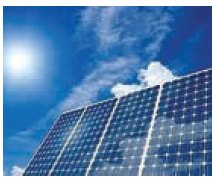Economics - Policies for Sustainable Development | 9th Social Science : Economics : Understanding Development: Perspectives, Measurement and Sustainability
Chapter: 9th Social Science : Economics : Understanding Development: Perspectives, Measurement and Sustainability
Policies for Sustainable Development
Policies for Sustainable Development
Use of Non-conventional Sources of Energy
India depends on thermal and hydro power plants to
meet its power needs. Both these sources have an adverse environmental impact.
Thermal power plants emit large quantities of carbon dioxide, which pollute the
environment.
Solar Power in India
Solar power is the conversion of energy from
sunlight into electricity either directly using photovoltaic cells or
indirectly using concentrated solar power.
Solar panels absorb the sunlight as a source of
energy to generate electricity. A solar electric system can reliably produce
electricity for our home and offices. These distributed solar systems are often
installed by home and business owners to reduce their electricity costs. Solar
power in India is a fast-developing industry.
Tamil Nadu is the state with highest installed
solar capacity in India. Tamil Nadu is one of the leading solar power producing
states in India. As on 31 July 2017, the total installed capacity in Tamil Nadu
is 1,697 MW.

Related Topics